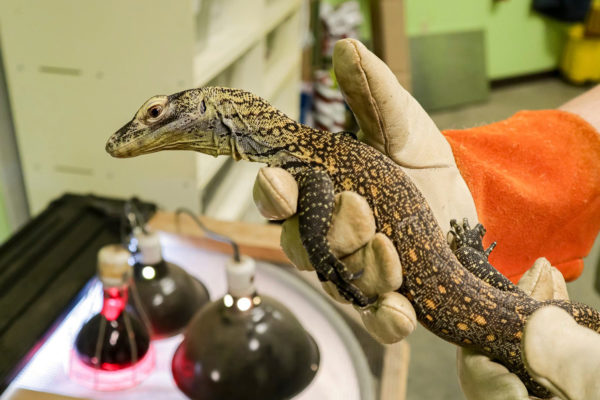
No paternity test needed — this Komodo dragon brought life into the world all on her own.
On Friday, the Chattanooga Zoo in Tennessee shared photos of its Komodo dragon Charlie and her three 7-month-old babies, Onyx, Jasper, and Flint, offering an update on the lizard family. Based on lab work, staff members found out that Charlie conceived the triplets solo.
Having a little fun with the findings, the zoo hilariously channeled The Maury Povich Show in its announcement to followers on Instagram.
“Our Komodo Dragon hatchling DNA results are in! *Maury Voice* Kadal, you are NOT the father!” the zoo began its caption.
The zoo explained that when the hatchlings arrived on Aug. 4, they didn’t know whether the new mom had reproduced with the help of the male she was paired with, Kadal, or by herself, with a process called parthenogenesis. The blood test proved it was the latter.
“Although Kadal and Charlie were placed together in hopes of breeding, our staff is very excited to witness this monumental work of nature and be part of such an important conservation program,” added the zoo.
RELATED: Two Cheetah Cubs Born Via IVF for the First Time in a ‘Ground-Breaking Procedure’
Never miss a story — sign up for PEOPLE’s free daily newsletter to stay up-to-date on the best of what PEOPLE has to offer, from juicy celebrity news to compelling human interest stories
Chattanooga Zoo
RELATED: Relatable Orangutan Mom with No Time For Baby’s Tantrum Pulls Kid Around Zoo Exhibit
The Chattanooga Zoo — which mentioned that the little Komodo dragons are “growing rapidly and doing very well” — explained that parthenogenesis is a “type of reproduction where the female produces offspring without male fertilization.”
“In the wild, Komodo dragons mainly live isolated and often become violent when approached, which has allowed these animals to evolve to reproduce both sexually and parthenogenetically,” the zoo said.
Other animals known to be able to reproduce the parthenogenetic way, according to BBC News, are some stick insects, snakes, and sawfish.
“She sort of replicated her DNA and made potentially — clones are a little bit different — but they’re all 100 percent hers and pretty much genetically identical to her,” a Chattanooga Zoo employee explained to the Times Free Press of Charlie’s independent motherhood.














